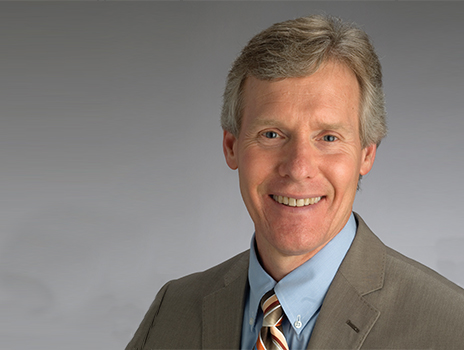Staff Spotlight: David Smith, MD, Sports Medicine Specialist


Some dubious medical advice David Smith, MD, received as a child may well have launched his career into sports medicine.
Dr. Smith was a runner at age 12 when he began experiencing knee pain. To his dismay, his pediatrician's advice was to stop running.
"They made me stop running," he says. "That was a killer to me. The doctor's way of taking care of my knee pain prevented me from doing what I loved."
Rather than turn away from his sport, Dr. Smith became vigilant about injuries and proper training techniques. Eventually, his experience led him to a career in sports medicine. He is currently a sports medicine specialist with The University of Kansas Health System’s Sports Medicine and Performance Center.
After completing undergraduate studies at Kansas State University, Dr. Smith attended the University of Kansas Medical School. He completed his family medicine residency at Michigan State University and a sports medicine fellowship at the Cleveland Clinic.
He began working at The University of Kansas Health System in 1989. Later, Dr. Smith went back to Kansas State as a physician for a number of team sports. Among them were the Olympic sports programs, baseball, dance and cheer squads, and all of the club sports.
In May 2013, he returned to the Sports Medicine and Performance Center to focus on caring for "anyone who is active." From competitive athletes to weekend warriors, Dr. Smith sees them all.
"I enjoy taking care of those who want to take care of themselves," he says. "Our goal is to keep people exercising and training and try to help them through their injuries."
In addition to orthopedic issues such as knee injuries, back and ankle problems, people who start fitness programs can run into roadblocks. These include abdominal pain, asthma and headache. Dealing with these obstacles early is important for people who want to remain active.
Dr. Smith sees athletes with training-related conditions – heat illness, concussion, skin and vision problems. During his career, he's observed major changes in how coaches approach practice routines.
"Sports medicine has really contributed to appropriate training," he says. "Fortunately, good coaches are following up on research and eliminating bad practices."
Dr. Smith lauded the Sports Medicine and Performance Center for its leadership in concussion management. Attention focused squarely on head trauma suffered by professional and collegiate athletes has increased awareness and education at every level of sports.
He said parents must foster good habits and attitudes in their young athletes. By doing so, they will train properly, incorporate good nutritional habits into their daily routines and keep the sport or exercise enjoyable.
"Sometimes we as parents push our kids too much," Dr. Smith says. "We forget that athletics and sports are supposed to be enjoyable. Let's try to keep things enjoyable for our children. And that includes helping them through injuries."
We offer a variety of appointment types. Learn more or call 913-588-1227 to schedule now.